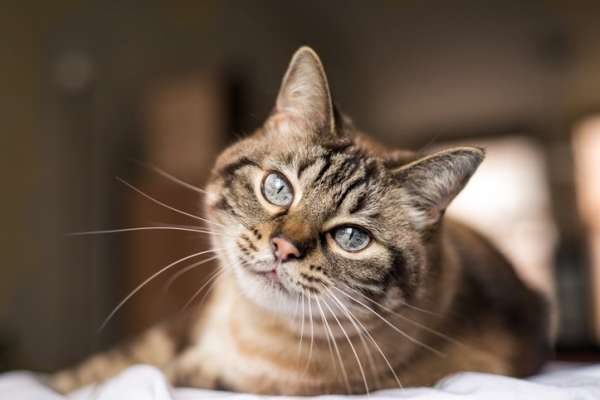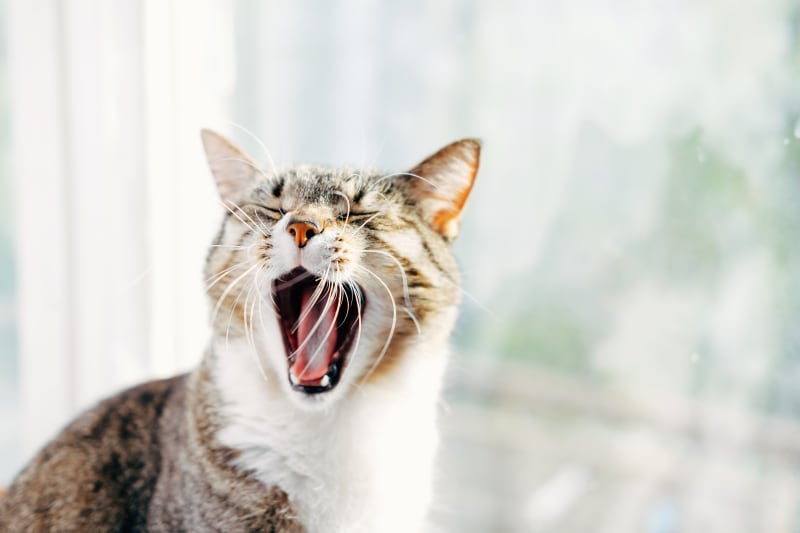Cat losing whiskers can be a normal shedding process, but if there are other symptoms, it may indicate an underlying health issue that needs attention. A cat’s whiskers are not just adorable features, but they serve as vital tools for sensory perception.
So, when your feline friend starts losing them, it can be quite concerning. However, before jumping to conclusions, it’s important to understand that whisker loss in cats can be a natural shedding process. Just like humans lose hair, cats shed their whiskers too, allowing new ones to grow.
But, if whisker loss is accompanied by other symptoms like skin irritations, behavioral changes, or weight loss, it may indicate an underlying health issue that needs veterinary attention. We will explore different factors that could cause whisker loss in cats and determine when you should be worried.
Contents
- 1 The Importance Of Whiskers For Cats
- 2 Signs Of Whisker Loss In Cats
- 3 Common Causes Of Whisker Loss In Cats
- 4 Natural Shedding Of Whiskers
- 5 Stress And Anxiety Affecting Whisker Loss
- 6 Medical Conditions Leading To Whisker Loss
- 7 Responding To Whisker Loss In Cats
- 8 Frequently Asked Questions For Cat Losing Whiskers: Should You Be Worried?
- 9 Conclusion
The Importance Of Whiskers For Cats
Whiskers are not just a cute feature on a cat’s face – they serve important functions in a cat’s sensory system. These specialized hairs, known as vibrissae, are rooted deeper in a cat’s body than regular fur, and they are connected to sensitive nerve endings.
| Awareness of surroundings | Whiskers are essential for a cat’s spatial awareness. By detecting changes in air currents, they help cats navigate through narrow spaces and judge distances before making leaps or pouncing on prey. |
| Communication | Whiskers play a role in social interactions among cats. They can extend forward when a cat is curious or friendly, signaling their intentions to other cats or even humans. |
| Mood indicator | Changes in a cat’s whisker positioning can indicate their emotional state. When a cat is scared or aggressive, their whiskers may be flattened against their face, while in a relaxed state, the whiskers are typically positioned forward. |
| Hunting and feeding | Whiskers help cats detect movement and assess the size and shape of their prey. They also play a role in guiding a cat’s precise movements during feeding. |
So, if you notice your cat losing whiskers, it could be a normal shedding process or a sign of an underlying health issue. Keep an eye on your cat’s overall well-being, and consult a veterinarian if you have any concerns.
Signs Of Whisker Loss In Cats
Whisker loss in cats can be a normal occurrence, but it’s essential to monitor any changes in their whisker length. As cats explore their surroundings, whiskers can naturally shed and be found around the house. This is typically nothing to worry about. However, if you notice that your cat’s whiskers are significantly shorter or if they are losing an excessive number of whiskers, it could indicate an underlying issue. Monitor your cat’s behavior for any signs of discomfort or changes in their eating habits as these can be red flags for a potential health problem. Should you notice any concerning symptoms, it is recommended to consult with a veterinarian to ensure your cat’s well-being.
Common Causes Of Whisker Loss In Cats
Cats losing whiskers is a natural occurrence. Just like humans shed hair, cats shed and replace their whiskers regularly. It is a part of their normal growth cycle. Additionally, stress and anxiety can also contribute to whisker loss in cats. Cats that are under stress may engage in excessive grooming or rubbing, leading to the loss of whiskers. It’s important to create a calm and comfortable environment for your cat to minimize stress.
However, whisker loss can also be a sign of an underlying medical condition. Certain medical conditions like dermatitis or skin allergies can cause whisker loss in cats. If you notice that your cat is losing whiskers excessively or if there are other accompanying symptoms such as skin irritation or redness, it is best to consult with a veterinarian.
| Medical Conditions | Symptoms |
|---|---|
| Dermaitis | Itching, redness, and irritation |
| Skin allergies | Itching, rash, and hair loss |
Natural Shedding Of Whiskers
Understanding the growth and shedding cycle of whiskers
Cats naturally shed their whiskers as part of their normal growth cycle, and this process is completely normal and healthy. Whiskers are specialized sensory organs that help cats navigate their surroundings and understand their environment. Similar to human hair, whiskers go through periods of growth and shedding.
How frequently do cats shed their whiskers? Cats shed their whiskers regularly, but the rate of shedding can vary from cat to cat. Some cats may shed a few whiskers every few months, while others may shed more frequently.
When should you be concerned about excessive whisker shedding? If you notice your cat losing an excessive amount of whiskers or if their whiskers are falling out in clumps, it may be a cause for concern. Excessive whisker shedding can be a sign of underlying health issues such as nutritional deficiencies or skin infections. If you have any concerns about your cat’s whisker loss, it is always best to consult with a veterinarian to rule out any potential problems.
Stress And Anxiety Affecting Whisker Loss
Is your cat losing whiskers? Don’t worry, it could be due to stress and anxiety. Learn more about this common issue and how to help your feline friend in our informative article.
Recognizing signs of stress and anxiety in cats is important to understand the potential reasons behind whisker loss. Cats exhibit various physical and behavioral symptoms when experiencing stress and anxiety. Look out for unusual behaviors like excessive grooming, hiding, aggression, or decreased appetite. Stressors can include changes in environment, new pets, or loud noises.
Stress can lead to whisker loss as cats may engage in over-grooming and excessive rubbing, causing their whiskers to break and fall out. Whiskers are highly sensitive and can shed when a cat is stressed or anxious.
To reduce stress and prevent whisker loss, create a calm and enriching environment for your cat. Provide hiding spots, interactive toys, and vertical spaces. Make sure they have a consistent routine and access to fresh water and litter box. Consider using pheromone diffusers or calming products to reduce anxiety.
Remember, observing the signs of stress and providing an appropriate environment tailored to your cat’s needs can help prevent whisker loss and improve their overall well-being.
Medical Conditions Leading To Whisker Loss
Cat losing whiskers can be caused by various medical conditions, such as dermatitis or ringworm, which may require immediate attention from a veterinarian. Keeping an eye on any associated symptoms like itching or hair loss can help determine if there’s a need for concern.
Dermatological Disorders Causing Whisker Loss
Whisker loss in cats can be a result of various medical conditions. Dermatological disorders are one such cause. These disorders affect the health of the cat’s skin, including the whiskers. Conditions like feline acne, dermatitis, and fungal infections can lead to the loss of whiskers. It is important to identify and treat these disorders to prevent further whisker damage.
Allergies And Their Impact On Whiskers
Allergies are another factor that can contribute to whisker loss in cats. Cats can develop allergic reactions to certain foods, environmental allergens, or certain medications. These allergies can result in itching, irritation, and inflammation of the skin, which can affect the vibrancy and health of the whiskers. Identifying and avoiding the allergens can help in preventing whisker loss due to allergies.
Hormonal Imbalances Affecting Whisker Health
Hormonal imbalances in cats can also play a role in whisker loss. Conditions such as hyperthyroidism or hypothyroidism can impact the overall health of the cat’s fur and whiskers. Hormonal imbalances can lead to brittle or thinning whiskers. Proper diagnosis and treatment of these hormonal issues can help restore the cat’s whiskers to their optimal state.
Responding To Whisker Loss In Cats
Responding to Whisker Loss in CatsProviding a balanced diet for optimal whisker health: A nutritious diet is crucial for maintaining your cat’s overall well-being, including their whiskers. Make sure their meals consist of high-quality protein, essential fatty acids, vitamins, and minerals.
Creating a stress-free environment for cats: Cats are sensitive creatures, and stress can contribute to whisker loss. Create a peaceful and calm space for your feline friend by providing hiding spots, vertical spaces, and interactive toys. Minimize loud noises and sudden changes.
When to consult a veterinarian: While occasional whisker shedding is normal, excessive or recurrent whisker loss may indicate an underlying condition. If your cat experiences bald patches, skin irritation, or any other worrisome symptoms, seek professional veterinary advice as they can determine the exact cause and provide necessary treatment.

Credit: canidae.com
Frequently Asked Questions For Cat Losing Whiskers: Should You Be Worried?
Why Is My Cat Losing A Lot Of Whiskers?
Cats may lose a lot of whiskers due to normal shedding or excessive rubbing. Shedding helps in replacing old whiskers with new ones, while rubbing can be a sign of irritation or stress. If you’re concerned, it’s best to consult a veterinarian for a proper diagnosis and treatment.
What Happens If A Cat Loses Her Whiskers?
Losing whiskers can affect a cat’s ability to navigate and sense their surroundings. Whiskers help cats judge distances, avoid obstacles, and detect changes in their environment. It’s essential to avoid cutting or damaging a cat’s whiskers to ensure their well-being.
Do Cats Lose Their Whiskers When They Get Older?
Yes, cats do not lose their whiskers as they get older. Whiskers play a vital role in a cat’s coordination and spatial awareness, so they remain intact throughout their lives.
What To Do With Fallen Cat Whiskers?
When your cat’s whiskers fall out, you can keep them as a memento or discard them.
Conclusion
Overall, it is important to monitor your cat’s whisker loss and look for any accompanying symptoms or changes in behavior. While some whisker loss is normal, excessive shedding may warrant a trip to the veterinarian. Regular grooming and a balanced diet can help maintain your cat’s whiskers and overall health.
By understanding the possible causes behind whisker loss, you can ensure that your feline friend remains happy and healthy. So, keep a close eye on your cat’s whiskers and consult a professional if you have any concerns.

Katie Lindsey is a passionate cat lover and founder of Cats Solution, a comprehensive resource for all things feline. With a lifelong love for cats and extensive knowledge in their care and behavior, she provides expert advice and solutions to cat owners. Through her website, Katie fosters a supportive community where cat enthusiasts can find guidance and heartwarming stories. A dedicated advocate for animal welfare, Katie also promotes responsible pet ownership and adoption. Join her on this purr-fect journey celebrating the joy of feline companionship.



